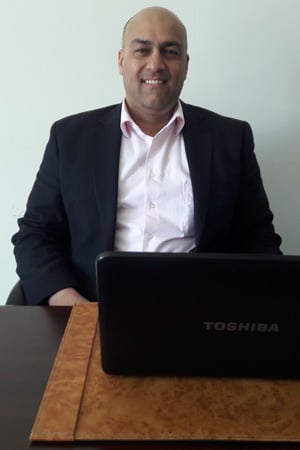Tribes central to post-war reconstruction
Research news
An Iraqi Deakin PhD graduate argues that non-formal cultural structures are crucial for successfully rebuilding communities after conflict.
Most graduates celebrate their graduations with their family, but Alfred Deakin Institute PhD graduate Ahmed Hassin’s family went one further, sourcing a gown and creating their own ceremony in Jordan earlier this year.
The ceremony was all the more memorable because Dr Hassin’s family had re-located to Jordan after ISIL moved into Iraq, travelling with Dr Hassin as he went from Jordan to Australia, to field work in Iraq and back to Jordan.
An Iraqi national, Dr Hassin’s thesis, supervised by Director of the Alfred Deakin Institute for Citizenship and Globalisation, Professor Fethi Mansouri, points to a possible way of rebuilding countries after conflict.
His work focused on two types of Civil Society Organisations: the formal type, such as non-government organisations (NGOs), and the non-formal groups he describes as tribes.
“I argued that those involved [in reconstruction] need to look beyond the more recognised NGOs and, instead, harness the forces of the non-formal cultural structures that bring people together, such as tribes,” Dr Hassin said.
One of the first questions Dr Hassin felt he needed to answer was whether tribes could be considered Civil Society Organisations.
“After 2003, the role the tribes played during the rebuilding of Iraq was similar to the role played by NGOs. At other times during the reconstruction, the role they played was a major one,” he said.
“Based on that analysis, I concluded they should be considered part of the civil society sector and, in countries such as Iraq, such social structures should be explored to help countries rebuild.”
Dr Hassin explained that tribes are collectivist communities bound by kinship, in terms of form, and solidarity, in terms of function, and they are not limited by, or rigidly adherent to, traditional activities.
He said tribes were unique to each rural or urban region and were more active and effective in areas where they had a greater degree of solidarity and commitment among their members.
“Originally all the social structures for Arabs came from that tribal origin,” he added.
“There are strong social ties that collect people together, particularly in remote areas, but even as people move to cities the relationship continues to exist.
“These social structures come in when times are tough; people try to get together to seek support and some kind of social security.
“This is the social structure that can be mobilised during times of crisis to help the State.”
Dr Hassin said after 2003, for instance, 40 tribes joined together to form a governing council that ruled the Salah al-Din governorate, resumed public services and opened a state facility.
“It was business as usual after the US moved and tribes helped the interim governing council until elections were held for a permanent president of the council.
“It’s exciting to come across such examples.”
Dr Hassin’s thesis drew on literature from Iraq, as well as Western scholars.
“You cannot understand another country without understanding its literature,” he said.
“In my thesis, I argue that before we extend Western theories to other countries, we need to look at the complementary literature that exists in those countries.”
Share this story

Key Fact
An Iraqi national, Dr Hassin’s thesis points to a possible way of rebuilding countries after conflict.
